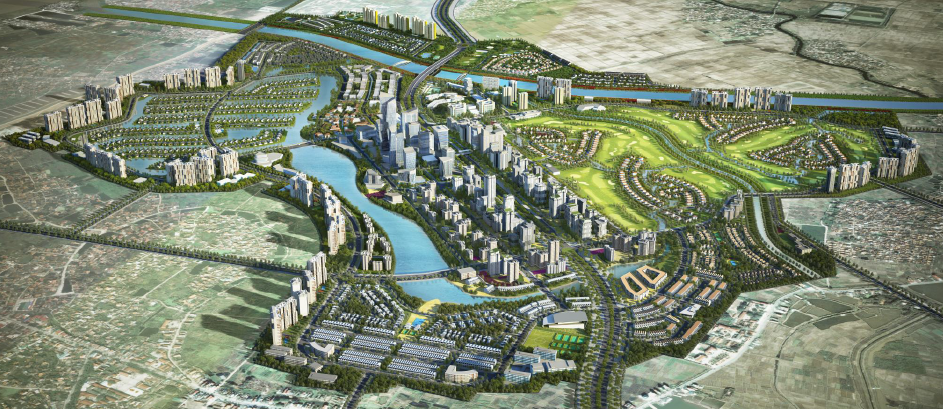Small apartments command market attention
In Circular No.21/2019/TT-BXD released in this April, the Ministry of Construction has given permission to developers to build at least 25 per centof the apartment units in their projects with the area of 25-45 square metres.
 |
| Sky Oasis Ecopark located in Hung Yen province invested by Ecopark Group JSC is offering small scale units to the market |
According to Le Hoang Chau, chairman of the Ho Chi Minh City Real Estate Association (HoREA), this is a good solution to meet the increasing demand for housing and reduce the shortage of affordable units in the market.
Almost three million immigrants in Vietnam’s largest city are in need of small apartments. In addition, smaller units will also attract foreign buyers living in Vietnam, Chau said.
Small units costing between VND750 million and VND1 billion ($32,600-43,480) are a suitable housing option for this group who require small but high-quality units.
These small apartments will also solve the housing needs of people with more modest finances, limit the prevalence of temporary housing, and activate the market by generating good consumption and exciting deals.
Before the new regulation was issued, to answer the high demand for small units, Ecopark Group JSC had begun building small units at the Ecopark project in Hung Yen province, 15 kilometres from Hanoi.
Sky Oasis Ecopark is selling units from 30 to 100 square metres with prices ranging from VND890 million to VND6 billion ($38,700-260,870) each.
However, there are also negative opinions about these types of properties. Tran Ngoc Chinh, chairman of the Vietnam Urban Development Planning Association, commented that the high density of small apartment units in a project could impact the neighbouring infrastructure system.
Aidan Wee, co-founder and executive director of PropNex Realty Vietnam, told VIR that the supply of small housing units often leads to speculation.
“Speculators buy early and in bulk only to sub-sell the units for quick capital gains. The rampant exploitation of these speculative opportunities was made possible by the huge supply and demand imbalance. Homebuyers with real demand will have to pay a premium to such investors if they are unable to secure a unit from the developer,” Wee said.
A vicious cycle is created when developers are tempted by the profit margin investors make by reselling their units and look to pocket some of this margin by increasing the selling price of subsequent units. This has driven the market price of affordable housing almost even with mid-end products.
“As such, I personally think that the proposal – while it is a step in the right direction – will not be effective by itself. A more comprehensive framework must be developed by the Ministry of Construction to support mass-market housing along with the concept of subsidised public housing in Singapore. Further moves by the ministry could be to introduce policies to curb speculation in the affordable housing segment and also other incentives to encourage developers to build affordable housing,” he added.
Meanwhile, Pham Lam, CEO of DKRA Vietnam, said that in order to limit the negative impacts of small unit speculation, the government must plan clearly in which locations can developers add small units to their projects. Priority should be given to areas near industrial zones, universities, and large-scale factories.
The proportion of permitted units should range from 10 to 25 per cent which should be decided based on location and the project’s infrastructure system.
“In general, small apartments are a solution based on real housing demand. However, in order for this policy to be complete and yield practical benefits, it is necessary to have strict and coordinated regulations from the government, the state, developers, organisations, and related bodies,” Lam said.
What the stars mean:
★ Poor ★ ★ Promising ★★★ Good ★★★★ Very good ★★★★★ Exceptional
Related Contents
Latest News
More News
- More than $40 billion investment recorded in Asia-Pacific commercial real estate (February 18, 2026 | 19:58)
- Keppel co-hosts Home Hanoi Xuan festival in Hanoi (February 14, 2026 | 09:00)
- Saigon Centre gains LEED platinum and gold certifications (February 12, 2026 | 16:37)
- Construction firms poised for growth on public investment and capital market support (February 11, 2026 | 11:38)
- Mitsubishi acquires Thuan An 1 residential development from PDR (February 09, 2026 | 08:00)
- Frasers Property and GELEX Infrastructure propose new joint venture (February 07, 2026 | 15:00)
- Sun Group led consortium selected as investor for new urban area (February 06, 2026 | 15:20)
- Vietnam breaks into Top 10 countries and regions for LEED outside the US (February 05, 2026 | 17:56)
- Fairmont opens first Vietnam property in Hanoi (February 04, 2026 | 16:09)
- Real estate investment trusts pivotal for long-term success (February 02, 2026 | 11:09)

 Tag:
Tag:





















 Mobile Version
Mobile Version